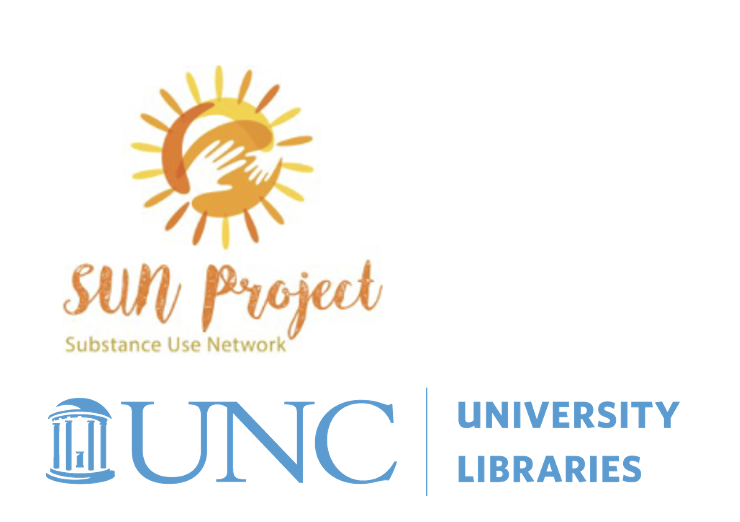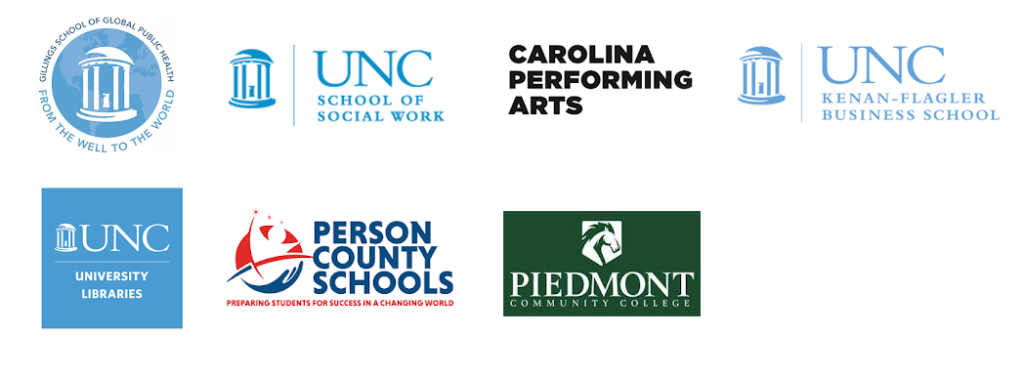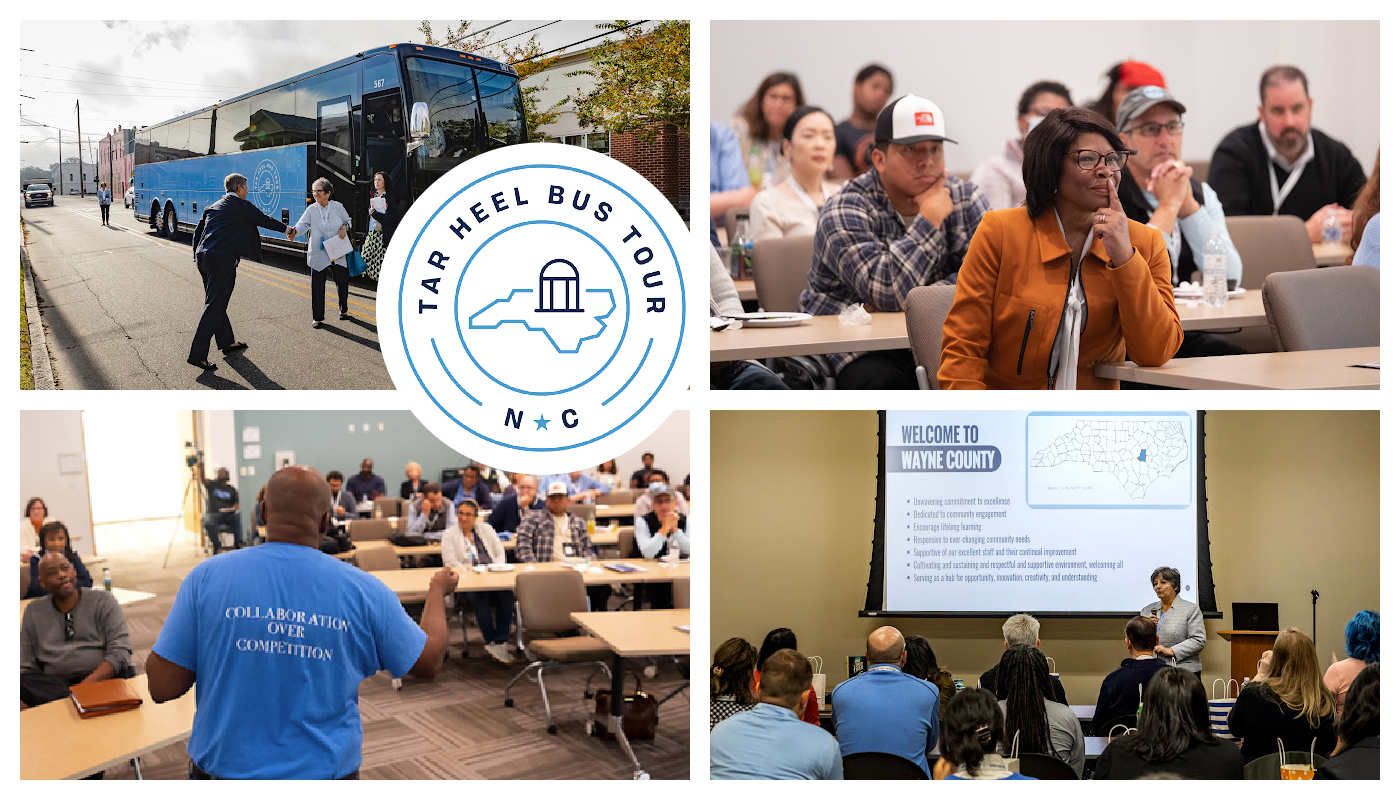Carolina leadership hit the road in October for the annual Tar Heel Bus Tour. Two buses covered both the east and west portions of North Carolina making 19 stops, each exhibiting the University’s commitment to serving all North Carolinians. Two of the stops were hosted by “Our State, Our Work” teams, showcasing their local efforts to connect young adults with living wage employment opportunities.
Tar Heel Bus Tour Stops
- Team 5 (Collaboration Over Competition) hosted University leaders at their headquarters in Cabarrus County on October 18. Team 5 is led by the Men of Destiny program, partnering with the governments and other community leaders of Cabarrus and Mecklenburg counties to provide Opportunity Youth with mentoring from local business and government leaders through hands-on internships. Through the “Levels of Leadership” Initiative, young adults receive opportunities to gain Level One certifications in construction while benefiting from training from the Southeastern Carpenters Regional Council. In addition to technical skills, young adults also receive social-emotional support from their community mentor.
- Team 11 (Wayne County Pathfinders) hosted a bus tour stop at the Wayne County Library, which is a lead partner in providing employment support, career fairs, volunteer opportunities, and community service opportunities for justice-involved youth. Other partners on the team include the Wayne County Chamber of Commerce, Wayne County Public Schools, Communities Supporting Schools of Wayne County, and Wayne Community College.
Tar Heel Bus Tour Minigrant Program
The Tar Heel Bus Tour grants program works to support the goals of the Tar Heel Bus Tour and encourage participants in the 2019 and 2022 Tar Heel Bus Tours to build on and maintain their connections across North Carolina by developing projects that address issues and needs in partnership with communities throughout the state. In 2023, Carolina Across 100 partnered with UNC Rural to offer $100,000 total in grant funding to these community-engaged projects that will have a meaningful impact across the state. These funded projects are ongoing in 14 North Carolina counties.
Celebration of Mothers | The Sun Project
Campus Partner(s): UNC Media and Design Center
Community Partner(s): SUN Project
The Sun Project supports pregnant mothers who are in recovery from substance abuse. This collaboration with The Sun Project will provide portraits of the mothers in their program. The goal is to capture this moment in a mother’s life, as well as celebrate the milestone for years to come. The benefit of this project is to provide a portrait session to the expectant mother, as well as a professionally printed product suitable for hanging in the home while engaging in a sober living activity, digital literacy, and soft skill development. The project itself would be utilized as a case study for the E(I) Lab program.

Developing training to increase access to fentanyl test strips via community pharmacies and reduce opioid overdose deaths in NC
Campus Partner(s): UNC School of Medicine
Community Partner(s):
- Holler Harm Reduction, Madison County, NC
- Rocky Point Pavilion Pharmacy, Pender County
- Roan Mountain Pharmacy, Mitchell County, NC
- Kelsave Drugs, Jackson County, NC
- North Carolina Association of Pharmacists
NC’s fentanyl-positive overdose death rate increased by 36% from 2020-2021. Fentanyl test strips (FTS) are low-cost strips that detect fentanyl in substances such as cocaine and pills, and are an evidence-based harm reduction strategy proven to reduce opioid overdose deaths.
FTS distribution is limited in NC, especially in rural areas. Although NC pharmacists can legally dispense FTS, only two currently do. A majority of NC community pharmacists are willing to sell FTS but do not know how. This development panel will create a pharmacist training to raise FTS awareness, address sales barriers, and increase access across the state.
There are currently no existing FTS trainings for pharmacists – this project will fill this gap. This project addresses the issue of limited access to FTS in NC by developing training to equip pharmacists with the information and skills they need to order, sell, and counsel patients on FTS. The panel of rural community pharmacists, harm reduction organizations, the state pharmacy association, the state health department, and educational specialists, who will co-create a FTS training for community pharmacists. The training will include: patient education materials; contact information for FTS distributors; counseling “cheat sheets” with tips on how to educate about FTS; and example social media posts and advertisements. The training will be distributed statewide, and assessed for whether it improves pharmacists’ outcomes, including FTS knowledge and comfort engaging customers in FTS discussions.

Resilient Robots: Teaching social emotional learning to children with disabilities through STEM play
Campus Partner(s):
- Department of Psychiatry
- Frank Porter Graham Child Development Institute
- Department of Communication
Community Partner(s):
- Kidzu Children’s Museum
- The Durham Museum of Life and Science
- The Carolina Community Academy
UNC’s Frank Porter Graham Child Development Institute and STEM Innovation for Inclusion in Early Education (STEMIE), Marbles Kids Museum, the Durham Museum of Life and Science, and the Carolina Community Academy, these will partner to develop a play-based curriculum that employs STEM play to teach children with disabilities social-emotional learning and leadership skills. We will focus on computational thinking and robotics. This grant funds a series of community discussions held at partner facilities and at UNC to assess needs, explore collaboration opportunities and potential obstacles.
Children with disabilities often do not have the same opportunities as their typically developing peers to access STEM subjects taught at school. Some children with disabilities also may encounter emotional challenges due to disability continuing to be stigmatized, leading to lack of confidence and poor self-esteem. Play is an important resource for accessing and learning about STEM and for learning to manage difficult emotions. Play empowers children to see themselves as innovators, problem solvers, and leaders. This project looks to engage children with disabilities, ages 6-10, in STEM play as a way to help them grasp STEM concepts and to utilize some of the challenges built into STEM play (design thinking, problem solving, empathy and collaboration) to help them develop SEL. This project will help them boost self-esteem and see themselves as leaders, where disability is not a deficit to be overcome, but an experience that provides meaningful insights and innovations.

UNC World View K-12 Global Education Summit in collaboration with Person County Schools and Piedmont Community College
Campus Partner(s):
- UNC Gillings School of Global Public Health
- School of Social Work
- Kenan-Flagler Business School
- UNC Libraries
- Carolina Performing Arts
Community Partner(s):
- Person County Schools
- Piedmont Community College
UNC World View, in collaboration with Person County Schools and Piedmont Community College, will invite K-12 and community college educators to attend the UNC World View Global Education Summit, which will feature a range of UNC speakers and dynamic sessions focused on global issues, teaching strategies and resources for integrating global content into curriculum. This program serves educators in all grade levels and disciplines, including the cultural arts, STEM, the humanities and more.
The UNC World View Global Education Summit illustrates UNC World View’s commitment to creating a pipeline of globally engaged K-14 students poised to
serve as global leaders in our state. K-14 educators play an integral role in shaping the future of all students in our state, region, and our country. For classroom educators to engage students, they need content and curriculum materials that are current, relevant, and filled with meaningful global content across grade levels and disciplines. This Global Education Summit will provide educators with professional development opportunities to expand the depth and breadth of their global knowledge by attending sessions with UNC faculty experts on a variety of global issues. The result is enhanced professional breadth for the teacher and greater global awareness for students as they become the world’s next generation of leaders. Even after the Summit concludes, the UNC World View team will continue to develop district partnerships and offer practical solutions for classroom engagement, equipping teachers with best practices and UNC resources.
- Strengthen their understanding of global issues and learn global content at home and abroad.
- Connect with UNC faculty members in speaker sessions, further enhancing their curriculum’s global content.
- Integrate the value of global learning by collaborating with peers and working with the UNC World View team.

Community Engaged Data Collection to Inform the Community Health Improvement Process in Granville and Vance Counties
Campus Partner(s):
- Dept of Nutrition, UNC Gillings School of Global Public Health
Community Partner:
- Granville Vance District Health Department
In 2021, Granville Vance District Health Department (GVDHD) completed a Community Health Assessment (CHA) and started work to develop their Community Health Improvement Plans (CHIP) around three priority areas. Across the areas, additional information and perspectives from community were deemed necessary in Year One of the process to better inform and implement work in future years. For the summer of 2023, UNC Gillings practicum student, with guidance from NCIPH staff, will develop, gather, and analyze community input to inform strategies.
The GVDHD CHIP identified three strategies- mental health and substance use disorder, access to healthcare, and engaging youth to advance community health and safety.
For access to healthcare, the workgroup wants to gather information through focus groups and key informant interviews from churches, currents community health workers, community-based organizations, senior centers, pharmacies, etc. to include preferred topics such as methods of communication about health resources, barriers to accessing eligible service, and what should trauma-informed care and other public health jargon be referred to in the community. With this information, future work would be informed to create impact by knowing the language for access to care messages, who the messengers should be, talking points, and root cause barriers to address. Specifically, the information gained would not only inform this strategy, but also be used to educate the community and lift up community voices to policymakers.
For mental health and substance use disorder, workgroups identified that they needed to better understand current training offerings related to the topic and identify priority populations based on the gaps. By better understanding which training is being offered where, and developing an agenda to fill gaps, education will be more equitably accessible in Granville and Vance counties.

NC Household Energy Equity Network
Campus Partner(s):
- UNC Center for Public Engagement with Science
- Department of Public Policy; University of North Carolina at Chapel Hill
- Department of Environmental Sciences and Engineering, UNC Chapel Hill
Community Partner(s):
- Department of Civil, Architectural, and Environmental Engineering, Center for Energy Research and Technology, North Carolina Agricultural and Technical State University
- Enpira
- Community Housing Solutions
- Piedmont Triad Regional Council
- NC Environmental Justice Network
- Affordable Housing and Community Connections
- Town of Chapel Hill
- Duke Energy
NC households experience higher energy burdens across race, education, housing tenure, and income status compared to other states. This project seeks to identify cost-effective, low-carbon, energy-efficient, and equitable housing improvements that are immediately available to North Carolina housing authorities and planners in the Piedmont. Combining efforts from the NC A&T Building Energy Living Lab (BELL), the team will evaluate energy consumption in NC households and identify opportunities to improve energy burdens and environmental health.
NC A&T has established a physical Building Energy Living Lab (BELL) that serves as an existing experimental low-to-moderate income house directly on NC A&T’s campus to test building energy consumption and ventilation. With this grant, building upgrades such as high-efficiency windows, solar panels, electric heat pumps, and energy storage technologies can be implemented and evaluated. This research facility adds a practical dimension to building energy systems that can be modeled using energy management software. The NC Household Energy Equity Network would enable graduate student interaction, travel, and collaboration between the BELL lab at NC A&T, UNC students, and community groups. This project brings together expertise in building energy management from NC A&T and analysis on socioeconomic indicators of energy burden and emerging energy storage technologies at UNC.
Long-term, the team will develop an environmental justice-based decision-support tool that will test technology solutions to reduce the gap in energy burden across race, income, housing status, and education level in North Carolina – leading to inter-institutional interdisciplinary research that sets a precedent for further work on household energy equity. Specifically, this collaboration will establish an experiential learning and cutting-edge research site for energy efficiency technology improvements, electric heat pump implementation, and electric energy storage for household use in central North Carolina.
Additionally, considering low-carbon energy technologies traditionally have been designed for high-income households, for an equitable and just transition to sustainable energy, UNC students can analyze technologies that can maximize the greatest benefit to households in NC who suffer from high-carbon, inefficient energy systems, poor household ventilation, and rising energy bills as a proportion of monthly income. For instance, some homes in NC use kerosene or diesel for heating.

Call for Applications
New in 2024, Carolina Across 100 is once again partnering with UNC Rural to offer Tar Heel Bus Tour minigrant funding. A total of $50,000 in funds will be awarded. Applications are due by March 28, 2024. Individual participants in the 2023 THBT may apply for grants of up to $5,000. Participants who partner with one or more other THBT participants may apply for up to $10,000. Grants will be awarded to participants who connect the project to their field of scholarship and demonstrate that the main beneficiaries of their efforts will be local communities. A total of $50,000 in funding is being provided by the Carolina Across 100 initiative and UNC Rural. Preference will be given to proposals/projects that:
- Are collaborative efforts involving community organizations and UNC-Chapel Hill THBT participants.
- Address a significant issue as defined by the community/state.
- Are part of an existing or a planned longer-term sustainable relationship with the community.
- Have the potential for lasting impact, may lead to a larger effort and/or leverage additional funds for additional engagement endeavors.
- Are connected to the applicant’s field of scholarship.
- Reach across traditional disciplinary boundaries to involve multiple schools/departments.
- Occur in an area prioritized by the funders of rural areas of the state and counties not already represented in Carolina Across 100.
Learn more from UNC Rural:



